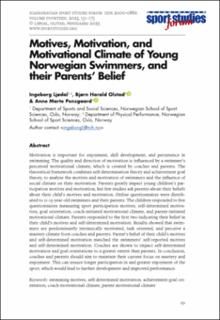| dc.contributor.author | Ljødal, Ingeborg | |
| dc.contributor.author | Olstad, Bjørn Harald | |
| dc.contributor.author | Pensgaard, Anne Marte | |
| dc.date.accessioned | 2024-03-18T16:14:55Z | |
| dc.date.available | 2024-03-18T16:14:55Z | |
| dc.date.created | 2024-02-09T15:54:06Z | |
| dc.date.issued | 2023 | |
| dc.identifier.citation | Scandinavian Sport Studies Forum. 2023, 14(2023), Side 151-175. | en_US |
| dc.identifier.issn | 2000-088X | |
| dc.identifier.uri | https://hdl.handle.net/11250/3122960 | |
| dc.description.abstract | Motivation is important for enjoyment, skill development, and persistence in swimming. The quality and direction of motivation is influenced by a swimmer’s perceived motivational climate, which is created by coaches and parents. The theoretical framework combines self-determination theory and achievement goal theory, to analyse the motives and motivation of swimmers and the influence of social climate on their motivation. Parents greatly impact young children’s participation motives and motivation, but few studies ask parents about their beliefs about their child’s motives and motivation. Online questionnaires were distributed to 11-13-year-old swimmers and their parents. The children responded to five questionnaires measuring sport participation motives, self-determined motivation, goal orientation, coach-initiated motivational climate, and parent-initiated motivational climate. Parents responded to the first two indicating their belief in their child’s motives and self-determined motivation. Results showed that swimmers are predominantly intrinsically motivated, task oriented, and perceive a mastery climate from coaches and parents. Parent’s belief of their child’s motives and self-determined motivation matched the swimmers’ self-reported motives and self-determined motivation. Coaches are shown to impact self-determined motivation and goal orientations to a greater extent than parents. In conclusion, coaches and parents should aim to maintain their current focus on mastery and enjoyment. This can ensure longer participation in and greater enjoyment of the sport, which would lead to further development and improved performance. | en_US |
| dc.language.iso | eng | en_US |
| dc.subject | achievement | en_US |
| dc.subject | coach motivational climate | en_US |
| dc.subject | goal orientation | en_US |
| dc.subject | parent motivational climate | en_US |
| dc.subject | self-determined motivation | en_US |
| dc.subject | swimming motives | en_US |
| dc.title | Motives, motivation, and motivational climate of young Norwegian swimmers, and their parents’ belief | en_US |
| dc.type | Peer reviewed | en_US |
| dc.type | Journal article | en_US |
| dc.description.version | publishedVersion | en_US |
| dc.rights.holder | © Ljødal, Olstad, Pensgaard 2023 | en_US |
| dc.source.pagenumber | 151-175 | en_US |
| dc.source.volume | 14 | en_US |
| dc.source.journal | Scandinavian Sport Studies Forum | en_US |
| dc.identifier.cristin | 2244757 | |
| dc.description.localcode | Institutt for fysisk prestasjonsevne / Department of Physical Performance | en_US |
| dc.description.localcode | Institutt for idrett og samfunnsvitenskap / Department of Sport and Social Sciences | en_US |
| cristin.ispublished | true | |
| cristin.fulltext | original | |
| cristin.qualitycode | 1 | |
